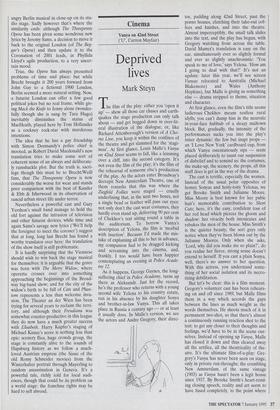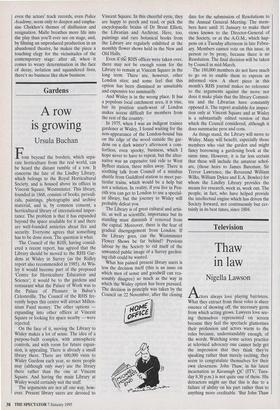Cinema
Vanya on 42nd Street (`U', Curzon Mayfair)
Deprived lives
Mark Steyn
The film of the play: either you 'open it up' — show all those car chases and earth- quakes the stage production can only talk about — and get bogged down in over-lit- eral illustration of the dialogue; or, like Richard Attenborough's version of A Cho- rus Line, you keep it within the confines of the theatre and get slammed for the 'stagi- ness'. At first glance, Louis Malle's Vanya on 42nd Street seems to fall, like a lemming over a cliff, into the second category. It's not even the film of the play; it's the film of the rehearsal of someone else's production of the play. As the actors enter Broadway's decrepit New Amsterdam Theatre, one of them remarks that this was where the Ziegfeld Follies were staged — cruelly underlining that, in the next two hours, not a single bead or feather will pass our eyes: not only don't the cast wear costumes, they hardly even stand up, delivering 90 per cent of Chekhov's text sitting round a table in the auditorium. To borrow Vanya's description of Yelena, the film is 'morbid with inaction'. Because I'd made the mis- take of explaining all this to her in advance, my companion had to be dragged kicking and screaming into the cinema, and, frankly, I too would have been happier contemplating an evening at Police Acade- my 12.
As it happens, George Gaynes, the long- suffering chief in Police Academy, turns up there as Aleksandr. Just for the record, he's the professor who returns with a young second wife Yelena to his country estate, run in his absence by his daughter Sonya and brother-in-law Vanya. This all takes place in Russia a century ago — or at least it usually does. In Malle's version, we see the actors and Andre Gregory, their direc- tor, padding along 42nd Street, past the porno houses, clutching their take-out cof- fees and knishes, and into the theatre. Almost imperceptibly, the small talk slides into the text, and the play has begun, with Gregory watching from across the table. David Mamet's translation is easy on the ear, simultaneously ever so slightly formal and ever so slightly anachronistic: 'You speak to me of love,' says Yelena. 'How am I going to deal with that?' It's not an update: later this year, we'll see screen Vanyas relocated to Australia (Michael Blakemore) and Wales (Anthony Hopkins), but Malle is giving us something else — drama stripped to theme, situation and character.
At first glance, even the film's title seems ludicrous: Chekhov means restless rural idylls; you can't dump him in the neurotic in-your-face hubbub of a sleazy midtown block. But, gradually, the intensity of the performances sucks you into the play's inner dynamic: the few but inapt props an 'I Love New York' cardboard cup, from which Vanya ostentatiously sips — seem placed deliberately to taunt our suspension of disbelief and to remind us: the costumes, the make-up, the scenery, the props, all this stuff does is get in the way of the drama.
The cast is terrific, especially the women. Instead of the usual polar opposites of homey Sonyas and hoity-toity Yelenas, we get Brooke Smith and Julianne Moore. Miss Moore is best known for her pubic hair's memorable contribution to Short Cuts; here, it's the easy, confident toss of her red head which pierces the gloom and shadow: her vivacity both intoxicates and rebukes the men of the house. Miss Smith's is the quieter beauty, the sort guys only notice when they've been blown out by the Julianne Moores. Only when she asks, `Lord, why did you make me so plain?', do you realise her fierce, strong sense doesn't extend to herself. If you cast a plain Sonya, well, there's no answer to her question. With this actress, you understand some- thing of her social isolation and its necro- tising debilitation.
But let's be clear: this is a film moment. Gregory's volunteer cast has been rehears- ing on and off since 1989, but Malle films them in a way which accords the gaps between the lines as much weight as the words themselves. He shoots much of it in permanent two-shot, so that there's almost a continuously running reaction shot to the text: to get any closer to their thoughts and feelings, we'd have to be in the scene our- selves. Instead of opening up Vanya, Malle has closed it down and thus cleared away all the artifice, all the theatricality of the- atre. It's the ultimate film-of-a-play: Gre- gory's Vanya has never been seen on stage, only in private run-throughs; the crumbling New Amsterdam, of the same vintage (1903) as Vanya hasn't been a legit house since 1937. By Brooke Smith's heart-rend- ing closing speech, reality and art seem to have fused completely, to the point where even the actors' track records, even Police Academy, seem only to deepen and empha- sise Chekhov's themes of disillusion and resignation. Malle breathes more life into the play than you'll ever see on stage, and, by filming an unproduced production in an abandoned theatre, he makes the piece a touching elegy for the vicissitudes of the contemporary stage: after all, when it comes to weary determination in the face of decay, isolation and squandered lives, there's no business like show business.



















































 Previous page
Previous page